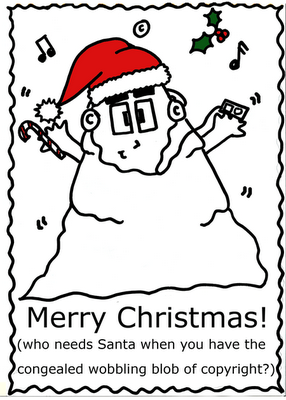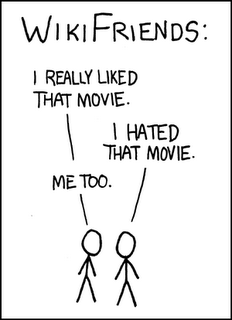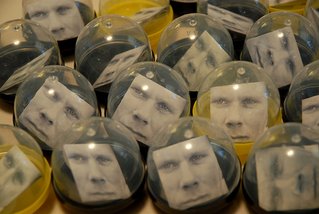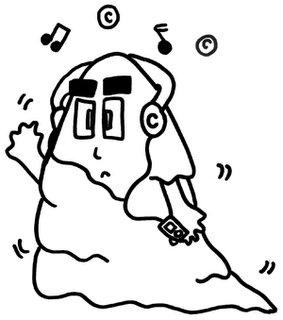Friday, December 29, 2006
Creative Commons Taiwan has since created a licence compatibility "wizard", which is very user-friendly and looks a little like a tic-tac-toe-ish. See the Creative Commons webblog entry about it here and the English version of the wizard here (for the multilingual commoner, the traditional Chinese version can be found here)
Labels: catherine, compatibility
Friday, December 22, 2006

At most houses you will find the usual Christmas paraphernalia such as trees, holly and Christmas stockings. You won't have the same experience here at the House of Commons. The visitor this particular Christmas is the Copyright Amendment Act 2006. To pay homage to the Copyright Amendment Act we have decided to decorate the Congealed Wobbling Blob of Copyright in lieu of a Christmas tree.
Thank you Attorney General Mr Philip Ruddock. Thank you for the gift of Congealed Wobbling Blob of Copyright.
So us housemates and the Congealed Wobbling Blob of Copyright wish all of you a very Merry Christmas and a Happy New Year.
And when you are singing Christmas carols in public, or perhaps recording your 4 year old on your mobile phone, singing along to the Wiggles cd you bought her for Christmas- beware...the Congealed Wobbling Blob of Copyright may creep up when you least suspect.
(Pictured: "Christmas Congealed Wobbling Blob of Copyright", Abi Paramaguru, Picture is available under either a AEShareNet
 Creative Commons Attribution 2.5 License.)
Creative Commons Attribution 2.5 License.)Read the article here, and credit must go to Peter Black at Freedom to Differ for being very quick off the mark in picking these things up.
It's great to be reading about Creative Commons in our local media, although I have to admit I was slightly stunned when I saw the words "Creative Commons" and "Sydney Morning Herald" in the same sentence and briefly wrote it down to a Christmas/sugar-induced hallucination. Admittedly, the article is an AP report, but kudos to the SMH for picking it up.
The article describes Creative Commons as pushing "copyright lite", a term which I will be sure to include in my thesis (as it will be the only time I can get away with including the word 'lite' in a doctoral thesis.)
Labels: catherine, Creative Commons
Thursday, December 21, 2006
On the 6th Day of Christmas: Start writing your submission to the Federal Government for when the provisions of the Copyright Amendment Act come under review. Need to remember what all the problems were? See House of Commons posts by Matthew Rimmer, Sarah Waladan and myself for inspiration!
On the 5th Day of Christmas: Wishing for a white Christmas? How about a Christmas of white pages? For some holiday reading, start with the OAK Law Project Report, which highlights the importance of open access in all areas of scholarship, continue with Yochai Benkler’s The Wealth of Networks and finish up with Lawrence Lessig’s latest tome, Code v2, all of which are licensed under Creative Commons licences.
On the 4th Day of Christmas: Write a Christmas song and license it. Really, how many more times do we need to hear "Rudolph the Red Nose Reindeer?" (There's a Wikipedia page for everything, isn't there?)
On the 3rd Day of Christmas: Try and imagine the Land of Copyright Maximalism and Perpetual Protection, where nothing will ever be free for reuse and use this place to scare small children who’ve had too much sugar and keep misbehaving. (“If you quote The Aristocats one more time the copyright police will be around here and they’ll arrest you, because you’ll be over the 10% criticism or review limit!”) Not only will this give kids a good telling off, you'll also help the commons by getting the younger generation involved in these issues! Everyone's a winner!
On the 2nd Day of Christmas: Give someone a public domain book as a Christmas present (preferably one that hasn’t been somewhat overexploited by Hollywood.) You never know, that book may inspire that next Clueless (based on Jane Austen’s Emma), West Side Story (based on Romeo and Juliet) or Bridget Jones’s Diary (which is kind of based on Pride and Prejudice)...
And...drumroll please.....
On the 1st Day of Christmas: Help expand the commons here at the House of Commons. Let us know your thoughts in the comments section, or contact us if you are interested in doing a guest post. We here at the House of Commons want to wish you a very merry Christmas and a wonderful New Year, and thank you for all your support as we’ve got off the ground this year! So feel free to pop in to the House and have a glass of egg nog (do we actually drink that in Australia?)!
Labels: catherine
Wednesday, December 20, 2006
- Analysis by Kim Weatherall here and later here (read about how Australian copyright law is becoming a "strange independent beast")
- Techdirt comments here
- "Copyright Ruling puts Linking on Notice", Sydney Morning Herald, 19/12/06
- "Australian Court Rules against MP3 Link Site", CNet News.com, 18/12/06
Sunday, December 17, 2006
See the Freedom to Differ post with more information and links here.
Labels: catherine, Creative Commons
Friday, December 15, 2006
 Here at the House of Commons we’re slowly starting to get over the Copyright Amendment Act and look to the festive season with glee. These amendments will have an enormous impact on the copyright commons in the future, but I’ve compiled a list so that, this Christmas, we can start to reduce some of the damage done. Here are the first six.
Here at the House of Commons we’re slowly starting to get over the Copyright Amendment Act and look to the festive season with glee. These amendments will have an enormous impact on the copyright commons in the future, but I’ve compiled a list so that, this Christmas, we can start to reduce some of the damage done. Here are the first six.On the 12th Day of Christmas: Update a Wikipedia page. Know a fact that few others do? Join Wikipedia and let the whole world know.
On the 11th Day of Christmas: License a work under a Creative Commons licence, or a licence of your choice. This is a gift you can give to everyone (note on behalf of everyone: a CC-licensed picture is better than socks).
On the 10th Day of Christmas: Brew up some free beer (and remember to share your recipe).
On the 9th Day of Christmas: Register for linux.conf.au – if you’re a source-y type, you might think that all your Christmases had come at once when you get to attend this conference.
On the 8th Day of Christmas: Make your Christmas cards out of Creative Commons-licensed images that you can find on flickr. Use the search engine here to find pics. Think about licensing any changes you make to pictures under a Sharealike licence, so that you not only give to your friends but give to the commons too.
On the 7th Day of Christmas: Feeling a bit scrooge-y? Read A Christmas Carol by Charles Dickens. And since it’s a public domain work, you can find it here at Project Gutenberg.
That's all for now...stay tuned for the next six in the coming week!
(Pictured: Smilin' Snowman, ShazzMack, licensed under a Creative Commons Attribution-Commercial-Sharealike 2.0 license)
Labels: catherine
Thursday, December 14, 2006

"Free software is a matter of liberty, not price. To understand the concept, you should think of free as in free speech, not as in free beer." (Richard Stallman, Free Software Definition)December 15 2006 is the fourth anniversary of Creative Commons. What is the best way to celebrate? With a cool refreshing glass of free beer of course!
What is free beer? It is promoted as "beer which is free in the sense of freedom, not in the sense of free beer." The project is the brain-child of a Copenhagen based artist collective called Superflex and a group of students at a Copehagen IT University. The underlying idea involves the application of free software/open source principles to a tangible item (close to the heart of many) - namely beer.
How do they go about it? The branding and recipe is released under a Creative Commons (Attribution-Sharealike) license. This means that anyone is free to produce and sell the beer and brew their own modified version of the beer, as long as they share the modified recipe. The recipe for Free Beer version 3.0 (codename: "Skands") is available here.
Lawrence Lessig rightly points out that recipes are not copyrightable. But I wonder- does this matter when it is the best beer you have had all year?
Richard Stallman seems to like the idea but unfortunately, does not drink beer.
Anyway, if you happen to be wondering around Blågårdsgade 5, Copenhagen on the 15th of December why not put on your dansende schoenen and join in the festivities for the fourth anniversary of Creative Commons. Creative Commons Denmark and the folks from Free Beer will be there. If that isn't enough enticement remember- Free Beer is now available on tap.
(Pictured: "My glass of beer", Lupinanto-Antonio Pennisi, available under a Creative Commons Attribution-NonCommercial-NoDerivs 2.0 License)
Labels: abi, Creative Commons, Fun
Wednesday, December 13, 2006

Jimmy Wales, founder of the Wikimedia Foundation (parent organisation of Wikipedia) has announced the next big thing to hit the wiki landscape. Openserving.com "extends the essence of the open source model-free software and content- to all aspects of web based computing."
The six pillars of OpenServing are:
"FREE software, FREE bandwidth, FREE storage, FREE computing power, FREE content over the Internet, and GIVING AWAY 100% of the ad inventory and revenue to bloggers and website owners who partner with Wikia" [Wikia press release].
The project may open the door for many more collaborative content projects, giving adminstrators of websites the opportunity to make money in the process.
“Social change has accelerated beyond the original Wikipedia concept of six years ago. People are rapidly adopting new conventions for working together to do great things, and Wikia is a major beneficiary of that trend. OpenServing is the next phase of this experiment. We don’t have all the business model answers, but we are confident – as we always have been – that the wisdom of our community will prevail” [Jimmy Wales, Wikia press release].
The project is an interesting nexus between open software and open content (as are the other wiki projects). I will be interested to see how this 'next level' wiki project unfolds and the resulting impact on the commons. At the very least it opens the door for a few more Star Wars, Star Trek and Doctor Who wikis to populate the World Wide Web. ..and that has to be a good thing...right?
(Pictured: "Wikifriends", Randall Munroe - via his excellent webcomic xkcd, available under a Creative Commons Attribution-NonCommercial 2.5 license)
 The Copyright Amendment Blob/Congealed Wobbling Blob of Copyright has taken the world by storm. So it is time to put the blob through its paces. I applied my version of the infamous trivia game, Six Degrees of Kevin Bacon, and here is what I came up with:
The Copyright Amendment Blob/Congealed Wobbling Blob of Copyright has taken the world by storm. So it is time to put the blob through its paces. I applied my version of the infamous trivia game, Six Degrees of Kevin Bacon, and here is what I came up with:- Kevin Bacon starred in the movie Sleepers alongside Robert De Niro.
- Robert De Niro produced the movie Entropy which featured a special appearance from U2 front man-Bono.
- Bono is one of many starving artists who were signatories to the full-page advertisement in the Financial Times pleading for a "fair play for musicians." Apparently, a 50 year term of protection for sound recordings isn't enough and the group of artists petitioned the government to extend the term to 95 years. In fact, the cause was so compelling that some artists managed to raise themselves up from the dead to put their name to the document. [Read more about the plight of Bono and like-minded artists in this article by Marina Hyde]
- The advertisement, "fair play for musicians" was a response to the Gowers report which recommends (among other things) the copyright term for sound recordings be maintained and not extended. Andrew Gowers, author of the report, is quoted as saying that extension of the copyright term beyond 50 years would only benefit "an exceptional few stars who are already fabulously rich." [Excellent commentary on the report can be located on Weatherall's Law and TechnoLlama.]
- The report prepared by Andrew Gowers simply follows Australia's lead on copyright. Well, such is the case if you ask our Attorney General Mr Philip Ruddock. I query why Gowers even bothered writing the 140 page report when apparently all that was required was "See Australian Copyright Law" (we housemates much prefer "See Blob"). [Read about the similarities in this post from Weatherall's Law]
- As we all know, Mr Philip Ruddock is intimately acquainted with the Congealed Wobbling Blob of Copyright/Copyright Amendment Blob/ Copyright Amendment Act 2006. [Read more here in previous post by Catherine Bond (featuring the blob).]
And thus, it is demonstrated- Kevin Bacon is within six degrees of the Copyright Amendment Blob. Are you?
(Pictured: "a little more than six degrees of Kevin Bacon", Matt Leclair, available under a Creative Commons Attribution-NonCommericial-ShareAlike 2.0 license)
Sunday, December 10, 2006
Obviously, the trend in licence drafting seems to be to err on the side of being ultra-specific so that, should the licence ever come before a court, a judge can be guided by the licences terms. However, if we want people to actually read and understand the licences, then in my view less is more.
The Creative Commons “three version approach” is an excellent method of allowing non-lawyers (or “humans” as the Commons Deed describes them) to understand what they can and cannot do with the licensed content. As we have seen though, critics have said that the “Human Readable Code” and the “Lawyer Readable Code” previously differed slightly, particularly when it comes to licence provisions regarding “derivative works” and these flaws were only evident when reading the “Lawyer Readable Code”.
Some licensing organisations however, for example, Creative Commons, should be congratulated for creating so many resources that users can read to find out more about their rights and obligations. Australian licensing organisation AEShareNet also deserves the same praise – their 22-page glossary is enormously helpful. These educative efforts go a long way in helping ordinary Australian users understand copyright law (and me, by the way – don’t judge me, it was a very long Act even before the recent 200 page amendments!)
This brings me to the Copyright Amendment Act. The first recommendation of the Senate Legal and Constitutional Affairs Committee report into the provisions of the Bill stated that the Government should undertake a “public awareness campaign and develop a ‘plain English guide’” that would help people understand what the amendments mean.
What a positive step this would be - because, let’s face it, copyright isn’t getting any easier to understand. Possibly my next-favourite Copyright Amendment Bill quotation (after Senator Andrew Bartlett’s) was from the Hon. Mr Duncan Kerr, who said, “copyright legislation now is a bugger’s muddle as far as the ordinary citizen is concerned.” (House of Representatives Hansard, 1 November, p. 27) I’m not entirely sure what a “bugger’s muddle” is but you get the picture. How can licence drafters be expected to make licences shorter and easier to understand if our national copyright law continues to expand in length and density?
This makes me think that perhaps it will fall to voluntary licensing to inspire governments to make the change from lengthy copyright law to simple, understandable provisions. Here’s hoping the “Human Readable” version of the Copyright Amendment Act comes out soon!
P.S. - I tried to use Flickr to find a CC-licensed picture of someone looking “confused” that I could add to this post. Instead, I ended up both dazed and confused as I searched through the 5100 photos that came up after I typed “confused” into the Creative Commons/Flickr search engine. Pity the poor people whose perplexed expressions are now free for reuse!
Labels: catherine
Friday, December 08, 2006
Sure, it's lots of reasons: Creative Commons has some funky technology, like RDF, that makes it easier for search engines to find licensed stuff. They've got brilliant marketing. And there are other reasons.
But something kind of disturbing just occurred to me. These search engines have Creative Commons features, and no other open content features. That's okay, but it does, in a sense, advertise Creative Commons. And this creates positive feedback: people use Creative Commons, search engines enhance support for Creative Commons, more people learn about Creative Commons, and more people use it. Etc.
So I hear people saying "yeah, but that's natural - the cream rises to the top". But it's more than that. There are people who have never heard of any type of open content licensing. And now Creative Commons is going to be the first they hear about the idea.
In summary, I think the other great licences may have been ahead of their time. Creative Commons came along at just the right time, with Web 2.0 happening and all that. And all those people who'd never given a thought to how to share legally were waiting, even if they didn't know it.
Thursday, December 07, 2006
 When the exposure draft of the Copyright Amendment Bill was released a little over two-and-a-half months ago, I have to admit I was blinded by love: I was just so happy that the Federal Government was going to make it legal to tape shows off the TV for later viewing and copy music onto my beloved iPod. Like any girl, I was willing to look past any flaws because of what I believed were gems in front of me.
When the exposure draft of the Copyright Amendment Bill was released a little over two-and-a-half months ago, I have to admit I was blinded by love: I was just so happy that the Federal Government was going to make it legal to tape shows off the TV for later viewing and copy music onto my beloved iPod. Like any girl, I was willing to look past any flaws because of what I believed were gems in front of me.All this time later, and what a fight it's been. The amendments were passed by the House of Representatives on Friday, Attorney General Mr. Philip "tougher on pirates, fairer on consumers" Ruddock (as I've heard him say here, here, here, and just two days ago here) has done an FAQ, and the Bill should receive Royal Assent on January 1 2007. Who could have predicted the many problems that came out of this Bill? It seemed that with each day, and with each view of Weatherall's Law, the problems just kept getting bigger and uglier.
At first, it seemed like the technological protection measures were the biggest nasty in the Bill. But then we all started to have a look at the new enforcement provisions, and that's when the penny dropped. Strict liability offences? For copyright law? That was pretty much when many of us – including Australia's "pesky academics" as the Australian Financial Review described them (tongue in cheek); industry organisations like the Internet Industry Association, Google, and Apple Australia; consumers and associated organisations like CHOICE; and, oh, voters - went into overdrive.
"This Bill is bad!" we cried. Free Mickey? That's so five years ago! Free the iPod! Free consumers! I could see the criminal poster: "Wanted for copyright crimes: CD Burner. Last seen producing illegal copies of Billy Joel's Piano Man." Well, the Government, to their credit, listened, and removed a number of the strict liability provisions.
And, admittedly, the Bill is not all bad. In addition to the time-shifting and format-shifting provisions, the Government also introduced another fair dealing exception, this time for satire and parody. A number of educational reforms were also introduced, so that educators won’t be financially charged for caching online materials used for educational purposes. The Government also clarified a number of changes made under the Copyright Amendment (Digital Agenda) Act 2000.
Now the Bill has been passed and, according to Ruddock, we are leading the way in copyright reform. What a day - Australia wins the 2nd Ashes test and we are leading the way in copyright! (If you detect a note of sarcasm in this post, then that's because, as you can probably guess, I'm a bit copyright-ed out.)
Just one final note though, perhaps Senator Andrew Bartlett deserves the last word on this Bill, for his acute ability to see the truth. As he said in the Senate Debates on the Bill, the Government took a bunch of different issues and put them together as "one congealed wobbling blob." (see the Senate Hansard, 30 November, p. 102) Here's to you, congealed wobbling blob of copyright.
(Pictured: "Congealed Wobbling Blob of Copyright", Abi Paramaguru, Picture is available under either a AEShareNet
 Creative Commons Attribution 2.5 License.)
Creative Commons Attribution 2.5 License.)Labels: catherine
Read more here in a post by Andres Guadamuz.
Labels: abi, Creative Commons
Monday, December 04, 2006
Okay, so I can hear you asking already what's my view on the GPL. Should more people use the GPL? Do I think the new draft is doing a good job of improving on version 2? Well, here's my standpoint straight up: before you can discuss the pros and cons of the GPL, you need to figure out where you stand on the philosophy. If you don't agree with the philosophy of free software, you can argue all day with someone who does and never get anywhere.
So when someone says to me "hey Ben, do you think this anti-tivoisation bit's right," I say "do you mean do I think it will stop tivoisation, or do you mean am I happy it's in the new draft?" If they mean the former, I remind them I'm not a lawyer. If they mean the latter, the answer is that I'm not willing to state a view on the philosophy. That's right, I'm a fence sitter.
Okay, the momentum of blogging is carrying me... I will say this much. I am happy that there is such a licence. I am happy that there exists a licence that people who believe in software freedom can use if they choose to. Writing your own on the electronic equivalent of a scrap of paper and shipping it with your software is not a good idea by anyone's estimation.
Andrew Tridgell, who recently won the Free Software Foundation Award for the Advancement of Free Software, said in no uncertain terms at our symposium last week that the GPL is not for everyone - it's not for people who want to restrict the freedom of their software, even if they have a valid or even vital reason to do so. I have to wholeheartedly agree.
And before I go, one last point. Some people out there in law land might think 'What does it matter about the philosophy? If you like what the licence says, that's enough of a reason to use it.' Well, that's not entirely true, because most licensors use the words "General Public Licence version X, or any later version" (emphasis added), and the licence itself clarifies what that means. If you licence like this, you're allowing the licence to be changed based on the underlying philosophy (which the Free Software Foundation strives to stay true to in drafting new versions), so you better be happy with that philosophy. If you're not happy with that philosophy, you can specificly licence under the current version only, but you may as well choose one of the other hundred or so Free and Open Source Software licences out there.
Labels: ben, free software
Sunday, December 03, 2006
Friday, December 01, 2006
See it here at our blog or here in the ASK-OSS newsletter, which every month delivers a great read about what's happening in Australian open source right to your inbox!
Labels: catherine
So here's what you can expect over the next few posts:
- A rundown of the General Public Licence version 3 (GPLv3) and Australia symposium that the Cyberspace Law and Policy Centre held on Thursday 30th November, with the help of Linux Australia. Housemate Abi Paramaguru was responsible for organising the event, which was enjoyed by all - so congratulations on an excellent job, Abi!
- A discussion of the OAK Law Report - I was lucky enough to attend the Sydney launch of the report on Thursday 30th November. The (now infamous) Copyright Amendment Bill and the OAK Law Report are about the same length - and I know which one I'd rather read (hint - it's the one that's licensed under a Creative Commons licence!)
So even with the silly season approaching it's full steam ahead here at the House of Commons!
Labels: catherine

